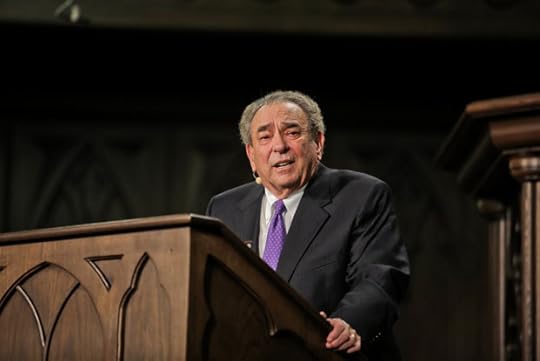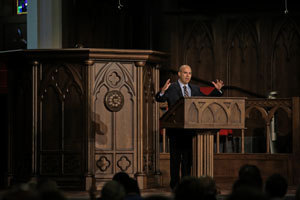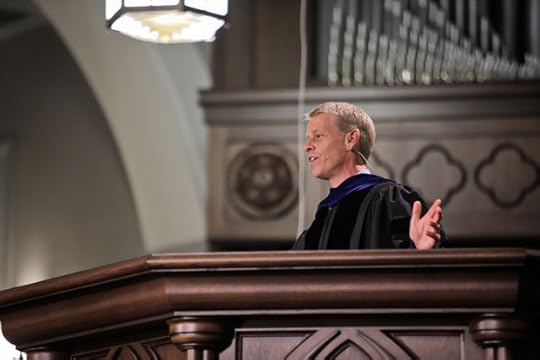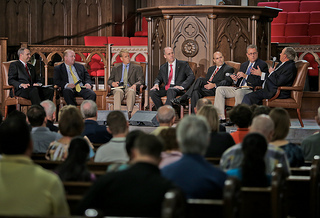R.C. Sproul's Blog, page 512
September 25, 2012
A New Faculty Member at Reformation Bible College: Dr. Ben C. Dunson
We are now well into our second academic year at Reformation Bible College (RBC), and strongly encouraged by our growing student body. As with last year's class, the new crop of students are eager to pursue their biblical and theological studies with us, and the faculty and staff count it a rare privilege and delight to serve them. What's more, it is not only the student body that grows from year to year at RBC—our curriculum grows as well, with new offerings added every semester to fulfill our various four-year bachelor of arts degrees. This in turn means that our faculty also needs to grow. With that in mind, it brings us no small joy to announce RBC's newest faculty member: Professor of New Testament, Dr. Ben C. Dunson.
 Ben Dunson currently teaches at Redeemer University College in Ontario, Canada. He completed his Ph.D. in 2011 at the University of Durham, U.K., focusing on Paul's Letter to the Romans. Previous to his Ph.D. studies, Ben earned an M.A.R. in Biblical Studies and a Th.M. in New Testament, both from Westminster Theological Seminary in Philadelphia, PA. Ben and his wife Martha have three young sons: William "Liam" Albert, Elliot Clark, and Calum Stephen. Do keep the Dunson family in prayer as they prepare to move from Canada to central Florida for Ben to begin teaching in January 2013.
Ben Dunson currently teaches at Redeemer University College in Ontario, Canada. He completed his Ph.D. in 2011 at the University of Durham, U.K., focusing on Paul's Letter to the Romans. Previous to his Ph.D. studies, Ben earned an M.A.R. in Biblical Studies and a Th.M. in New Testament, both from Westminster Theological Seminary in Philadelphia, PA. Ben and his wife Martha have three young sons: William "Liam" Albert, Elliot Clark, and Calum Stephen. Do keep the Dunson family in prayer as they prepare to move from Canada to central Florida for Ben to begin teaching in January 2013.
Keep RBC in your prayers as well, that God will continue to equip us to equip our students; that we will remain unswervingly convicted about the need for rigorous biblical and theological studies at the undergraduate level. Certainly, men the likes of Dr. Ben Dunson could be teaching at the graduate and post-graduate levels, but by God's grace we have brought him here to teach the church's college-aged sons and daughters, young people who will go on to any number of different fields like medicine, missions, and motherhood. RBC's faculty hiring agenda is a reflection of the solid commitment and child-like hope that grip us: only through a deeper knowledge of God's Christ-revealing Word, will the light of truth shine into the darkness of our age, and the church see another generation of reformers.

September 24, 2012
Discerning the News
Here's an excerpt from Discerning the News, Sarah Bailey's contribution to the September issue of Tabletalk.
It's no secret that many Christians harbor deep skepticism of the "liberal media elite." Some have been burned by the media, noting unfair or unfriendly coverage from the past. "I never just accept what newspapers say about people. I've seen them get facts, quotes, and reasons wrong far too many times," California pastor Rick Warren wrote on Twitter earlier this year. Or, as popular blogger Jon Acuff has suggested, Christians tend to treat the secular media as though it were Satan's newspaper.
The skepticism runs deeply in response to perceptions Americans feel about how the media treats religion. Just 19 percent of Americans say the news media is friendly to religion, a poll from the Pew Center found in a March 2012 survey. Skepticism of the media seems to run deeper for evangelicals, at least when reporters cover religion. About half of evangelicals believe the press is "unfriendly" to religion, compared to 35 percent of Americans overall. The result can be a tendency for media consumers to read only those we agree with or ideas we want to affirm.
Continue reading Discerning the News.

September 23, 2012
What Does Sola Scriptura Mean?

The Reformation principle of sola Scriptura has to do with the sufficiency of Scripture as our supreme authority in all spiritual matters. Sola Scriptura simply means that all truth necessary for our salvation and spiritual life is taught either explicitly or implicitly in Scripture. It is not a claim that all truth of every kind is found in Scripture. The most ardent defender of sola Scriptura will concede, for example, that Scripture has little or nothing to say about DNA structures, microbiology, the rules of Chinese grammar, or rocket science. This or that "scientific truth," for example, may or may not be actually true, whether or not it can be supported by Scripture—but Scripture is a "more sure Word," standing above all other truth in its authority and certainty. It is "more sure," according to the apostle Peter, than the data we gather firsthand through our senses (2 Peter 1:19). Therefore, Scripture is the highest and supreme authority on any matter on which it speaks.
But there are many important questions on which Scripture is silent. Sola Scriptura makes no claim to the contrary. Nor does sola Scriptura claim that everything Jesus or the apostles ever taught is preserved in Scripture. It only means that everything necessary, everything binding on our consciences, and everything God requires of us is given to us in Scripture (2 Peter 1:3).
Furthermore, we are forbidden to add to or take away from Scripture (cf. Deut. 4:2; 12:32; Rev. 22:18–19). To add to it is to lay on people a burden that God Himself does not intend for them to bear (cf. Matt. 23:4).
Scripture is therefore the perfect and only standard of spiritual truth, revealing infallibly all that we must believe in order to be saved and all that we must do in order to glorify God. That—no more, no less—is what sola Scriptura means.
"The whole counsel of God, concerning all things necessary for his own glory, man's salvation, faith, and life, is either expressly set down in scripture, or by good and necessary consequence may be deduced from scripture: unto which nothing at any time is to be added, whether by new revelations of the Spirit, or traditions of men." — Westminster Confession of Faith
Adapted from John MacArthur's contribution to Sola Scriptura: The Protestant Position on the Bible.

Twitter Highlights (9/23/12)
Here are highlights from our various Twitter accounts over the past week.
The most significant women in Scripture were influential not because of their careers, but because of their character (John MacArthur).
— Tabletalk Magazine (@Tabletalk) September 18, 2012
In Christ Alone available in Korean thanks to @_jipyung instagr.am/p/PxV6IzrbHe/
— Reformation Trust (@RefTrust) September 19, 2012
He has not learnt the nature of piety, who thinks it too much to be pious in all his actions (W. Law).
— Ligonier Academy (@LigonierAcademy) September 19, 2012
This is our fundamental nature as sinners: to be fugitives from the presence of God. —R.C. Sproul
— Ligonier Ministries (@Ligonier) September 20, 2012
We live in a time of practical atheism. —R.C. Sproul
— Ligonier Ministries (@Ligonier) September 21, 2012
Dr. Stephen Nichols mentions @ligonierconnect as a valuable resource for growing in your walk @refbiblecollege Fall conference
— Ligonier Connect (@LigonierConnect) September 22, 2012
When the light comes in on our fallen humanity we have a preference, the darkness. —R.C. Sproul #lmfc
— Ligonier Ministries (@Ligonier) September 22, 2012
You can also find our various ministries on Facebook:
Ligonier Ministries | Ligonier Academy | Ligonier Connect | RefNet
Reformation Bible College | Reformation Trust | Tabletalk Magazine

September 22, 2012
An Edifying 2012 Fall Conference

The past two days have seen Christians travel far and wide for our 2012 Fall Conference at Reformation Bible College (RBC). These Christians toured RBC, met the faculty, walked the Ligonier campus, and enjoyed teaching and fellowship focused around our conference theme of "Surprised by God."
 The morning began as George Grant discussed the development of Christian literature in the twentieth century, and the powerful impact it continues to have today.
The morning began as George Grant discussed the development of Christian literature in the twentieth century, and the powerful impact it continues to have today.
Stephen Nichols then focused on the doctrine of Scripture, showing us that the issue has evolved from being one of a scientific debate, to which inerrancy was the answer, to the challenge of the sufficiency of Scripture. "The grass withers, the flower fades, but the word of our God stands forever" (1Pet. 24-25, Isa. 40:8).
R.C. Sproul Jr.'s message was a call for all Christians to wonder before the magnificence of God's love, the beauty of His creation, and to trust in Him as our true Father in heaven.
 With Exodus 40 as his prmary text, Michael Morales then presented the significance of the shekinah glory as seen in the Old Testament manifestation of the presence of God. He concluded by showing us that because of Christ our humanity has now become the dwelling place of God.
With Exodus 40 as his prmary text, Michael Morales then presented the significance of the shekinah glory as seen in the Old Testament manifestation of the presence of God. He concluded by showing us that because of Christ our humanity has now become the dwelling place of God.
R.C. Sproul closed the conference teaching from Isaiah 6:1-3. He addressed the issue of the universal problem of mankind's blindness to the glory of God. He reminded us that even though all creation may be seen as a theatre to display the wonder, beauty, and glory of God, the natural man sees not because he can't stand to.
Twitter Highlights
God always chooses the most unlikely of champions to carry forth the greatest of news. —George Grant #lmfc
— Ligonier Ministries (@Ligonier) September 22, 2012
God, the great Shepherd, will gather us into His bosom and see to it that we will get home. —Stephen Nichols #lmfc
— Ligonier Ministries (@Ligonier) September 22, 2012
Wonder is what grows out of a profound experience of how small you are, and how big God is. —@rcsprouljr #lmfc
— Ligonier Ministries (@Ligonier) September 22, 2012
Christ, like the tabernacle, is both the dwelling of God and the way to God. —Michael Morales #lmfc
— Ligonier Ministries (@Ligonier) September 22, 2012
When the light comes in on our fallen humanity we have a preference, the darkness. —R.C. Sproul #lmfc
— Ligonier Ministries (@Ligonier) September 22, 2012
As our 2012 Fall Conference at Reformation Bible College comes to a close, our prayer is that those who attended will walk away humbled, recognizing their position as creatures before our transcendent and holy Creator, and amazed at God's glory.
Lord willing, all of the sessions from this conference will soon be available to stream for free at Ligonier.org. Stay tuned for an announcement.

Our 2012 Fall Conference at Reformation Bible College is Underway

Yesterday afternoon, our 2012 Fall Conference at Reformation Bible College began. Christians travelled far and wide to tour Reformation Bible College (RBC), walk the Ligonier campus, and to join together for a time of teaching and fellowship as we consider the conference theme, "Surprised by God."
 George Grant, Keith Mathison, Michael Morales, Stephen Nichols, R.C. Sproul, and R.C. Sproul Jr. opened the conference with a pre-conference round table discussion on Christianity, culture, and the reign of Christ over all things.
George Grant, Keith Mathison, Michael Morales, Stephen Nichols, R.C. Sproul, and R.C. Sproul Jr. opened the conference with a pre-conference round table discussion on Christianity, culture, and the reign of Christ over all things.
Stephen Nichols gave the formal address during RBC's convocation ceremony and showed us four surprises of God from Exodus 25:21–22, Romans 3:21–26, and the life of Martin Luther.
God used a troubled man like Martin Luther.
God chose the weak and insignificant nation of Israel over the superpowers of the world.
God meets us in Christ.
God demonstrates His power by sustaining us in the gospel.
Twitter Highlights
Our Fall Conference opens with a Pre-Conference Round Table Discussion: The Lamb Who Reigns. #lmfcinstagr.am/p/P2bx8fCajh/
— Ligonier Ministries (@Ligonier) September 21, 2012
Every religious system in the universe is predicated by the notion that we can be good enough to meet God, except Christianity #lmfc
— Ligonier Ministries (@Ligonier) September 22, 2012
Today is the final day of the conference. Please pray that all those in attendance would have a renewed amazement at God's glory as they see afresh that our thoughts are not His thoughts and that our ways are not His ways.
Lord willing, all of the sessions from this conference will soon be available to stream for free at Ligonier.org. Stay tuned for an announcement.

September 21, 2012
Who Are the Sons of God and Daughters of Men in Genesis 6:1-5?
"When man began to multiply on the face of the land and daughters were born to them, the sons of God saw that the daughters of man were attractive. And they took as their wives any they chose. Then the Lord said, "My Spirit shall not abide in man forever, for he is flesh: his days shall be 120 years." The Nephilim were on the earth in those days, and also afterward, when the sons of God came in to the daughters of man and they bore children to them. These were the mighty men who were of old, the men of renown. The Lord saw that the wickedness of man was great in the earth, and that every intention of the thoughts of his heart was only evil continually." — Genesis 6:1-5
There are several competing theories on this admittedly peculiar text, a few of them fantastic, at least one of them rather pedestrian, ordinary. Some suggest, for instance, that what is happening here is that angels, typically fallen angels or demons, are intermarrying with human women. My position is the far more pedestrian one, but one that carries with it an important lesson.
First, why I reject this more fantastic view. Angels, whether fallen or not, and though I am happy to concede they can appear in human form, are spirit beings. They have no bodies. Most of the time most of us remember this, though here some seem to forget. Because angels are spirit beings they are not equipped to consummate a marriage and to sire offspring. Demons can do all sorts of shocking and even frightening things. This, however, is not one of them. They can't bring forth giants because they simply can't bring forth.
When we consider the context of this text we can better understand what Moses is explaining. In previous chapters we are given a glimpse of two competing lines, the godly line of Seth and the wicked line of Cain. Having established the antithesis in the garden, after affirming that there would be a constant struggle between the seed of the woman and the seed of the serpent we are given snapshot pictures of each of these armies. We see Seth's line about the business of exercising dominion, in submission to the Lord. We see Cain's line dishonoring the law of God and making names for themselves. But the future is not mere co-existence between the two lines. The drama builds toward the great crisis of Noah's flood right here in chapter 6. The great change, what creates the great downward spiral of humanity on the earth is that the two lines come together as one. That is, the godly line of Seth, the sons of God, seeing how attractive are the daughters of men, the wicked line of Cain, decide to take them as wives. The end result, however, isn't mere dilution. It's not that the now joined line becomes morally lukewarm, but that evil spreads, grows, deepens. This shouldn't surprise as for as Chuck Swindoll reminds us, if you drop a white glove in the mud, the mud doesn't get all glovey.
What we see is salt losing its savor. We see what becomes of intermarrying not with a different race, but a different covenant, or a different faith. What we see is what happens when we are unequally yoked. Nothing, of course, has changed. When the children of God find the world attractive, when we determine to yoke ourselves to it, calamity comes. The world does not get any better, but the church, no longer a light on the hill, becomes much worse, and darkness falls upon the land. We are no longer useful for anything and find ourselves trampled upon the ground.

$5 Friday: Heaven, Grace, & The Trinity

It's time for our weekly $5 Friday sale. This week's resources cover such topics as Heaven, grace, the Trinity, temptation, apologetics, Calvinism, ecclesiology, theology, and more.
Sale runs through 12:01 a.m. — 11:59 p.m. Friday EST.
View today's $5 Friday sale items.

September 20, 2012
Jesus is the King of Kings

The gospel of Luke ends with a supremely jarring statement: "Then he led them out as far as Bethany, and lifting up his hands he blessed them. While he blessed them, he parted from them and was carried up into heaven. And they worshiped him, and returned to Jerusalem with great joy, and were continually in the temple blessing God" (24:50–53).
What is jarring about this passage is, as Luke reports the departure of Jesus from this world, the response of His disciples was to return to Jerusalem with "great joy." What about Jesus' departure would instill in His disciples an emotion of sheer elation? This question is made all the more puzzling when we consider the emotions the disciples displayed when Jesus earlier had told them that His departure would come soon. At that time, the idea that their Lord would leave their presence provoked in them a spirit of profound remorse. It would seem that nothing could be more depressing than to anticipate separation from the presence of Jesus. Yet, in a very short period of time, that depression changed to unspeakable joy.
We have to ask what is it that provoked such a radical change of emotion within the hearts of Jesus' disciples. The answer to that question is plain in the New Testament. Between the time of Jesus' announcement to them that He would soon be going away and the time of His actual departure, the disciples came to realize two things. First, they realized why it was that Jesus was leaving. Secondly, they understood the place to which He was going. Jesus was leaving not in order that they might be left alone and comfortless, but that He might ascend into heaven. The New Testament idea of ascension means something far more weighty than merely going up into the sky or even to the abode of the heavenlies. In His ascension, Jesus was going to a specific place for a specific reason. He was ascending into heaven for the purpose of His investiture and coronation as the King of kings and Lord of lords. The New Testament title used to describe Jesus in His kingly role is the "King of kings" and likewise the title "Lord of lords." This particular literary structure means more than Jesus' establishment in a position of authority by which He will rule over lesser kings. Rather, it is a structure that indicates the supremacy of Jesus in His monarchical majesty. He is King in the highest possible sense of kingship.
In biblical terms, it is unthinkable to have a king without a kingdom. Since Jesus ascends to His coronation as king, with that coronation comes the designation by the Father of a realm over which He rules. That realm is all creation.
There are two gross errors in modern theology regarding the biblical concept of the kingdom of God. The first is that the kingdom has already been consummated and that nothing is left for the reign of Christ to be made manifest. Such a view can be described as over-realized eschatology (last things). With the realization of the fullness of the kingdom, there would be no more to look forward to in terms of the triumph of Christ. The other error is that which a vast number of Christians believe, that the kingdom of God is something totally futuristic — that is, in no sense does the kingdom of God exist already. This view takes such a strong attitude toward the future dimension of the kingdom of God that even such New Testament passages as the Beatitudes of Matthew 5–7, have no application to the church today because they belong to the future age of the kingdom, which has not yet begun.
Both of the above views do violence to the clear teaching of the New Testament that the kingdom of God has indeed begun. The King is already in place. He has already received all authority on heaven and on earth. That means that at this very moment the supreme authority over the kingdoms of this world and over the entire cosmos is in the hands of King Jesus. There is no inch of real estate, no symbol of power in this world that is not under His ownership and His rule at this very moment. In Paul's letter to the Philippians, in chapter 2, in the so-called kenotic hymn, it is said that Jesus is given the name that is above all names. The name that He is given that rises above all other titles that anyone can receive, is a name that is reserved for God. It is God's title Adonai, which means the "One who is absolutely sovereign." Again, this title is one of supreme governorship for the One who is the King of all of the earth.
The New Testament translation of the Old Testament title adonai is the name lord. When Paul says that at the name of Jesus every knee must bow and every tongue confess, the reason for the bowing in obeisance and for confessing is that they are to declare with their lips that Jesus is Lord — that is, He is the sovereign ruler. That was the first confession of faith of the early church.
Then Rome, in her misguided, pagan tyranny tried to enforce a loyalty oath to the emperor cult of religion, in which all people were required to recite the phrase kaisar kurios — "Caesar is lord." The Christians responded by showing every possible form of civil obedience, by paying their taxes, by honoring the king, by being model citizens; but they could not in good conscience obey the mandate of Caesar to proclaim him lord. Their response to the loyalty oath, kaisar kurios, was as profound in its ramifications as it was simple in its expression, Jesus ho kurios, Jesus is Lord. The lordship of Jesus is not simply a hope of Christians that someday might be realized; it is a truth that has already taken place. It is the task of the church to bear witness to that invisible kingdom, or as Calvin put it, it is the task of the church to make the invisible kingdom of Christ visible. Though invisible, it is nevertheless real.
Originally published in Tabletalk magazine.

September 19, 2012
The Christian’s GPS
Here's an excerpt from The Christian's GPS, Anthony Selvaggio's contribution to the September issue of Tabletalk.
One of the great inventions of the modern world is the global positioning system (GPS). The devices that use this satellite system make travel easier and enhance marital bliss by eliminating disputes between husbands and wives regarding the need to ask for directions. By providing an objective and authoritative standard, the GPS has removed subjectivism and personal opinion from the process of navigation.
In some ways, God's Word is like a GPS device. Like that device, the Bible provides us with an objective standard to guide us in the direction we should go. Of course, our culture has rejected this role for God's Word. When it comes to truth and authority, our culture believes that truth is, at best, unknowable and that authority resides with the individual. Both of these cultural presuppositions ultimately lead to one reality—in our culture, truth is subject to the tyranny of the individual.
Continue reading The Christian's GPS.

R.C. Sproul's Blog
- R.C. Sproul's profile
- 1931 followers



